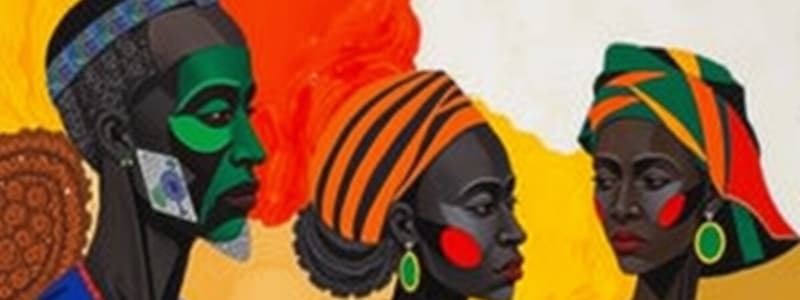Podcast
Questions and Answers
Which ethnic group is predominantly found in the northern region of Nigeria?
Which ethnic group is predominantly found in the northern region of Nigeria?
- Igbo
- Hausa-Fulani (correct)
- Edo
- Yoruba
What is the primary religion practiced by the majority of the Yoruba people?
What is the primary religion practiced by the majority of the Yoruba people?
- Islam
- Christianity (correct)
- Buddhism
- Indigenous beliefs
Which ethnic group is known for its entrepreneurial spirit and vibrant culture?
Which ethnic group is known for its entrepreneurial spirit and vibrant culture?
- Ijaw
- Kanuri
- Igbo (correct)
- Tiv
What aspect of Nigerian society does federalism aim to accommodate?
What aspect of Nigerian society does federalism aim to accommodate?
What has exacerbated ethnic and religious tensions in northern Nigeria?
What has exacerbated ethnic and religious tensions in northern Nigeria?
Which ethnic group is known for its fishing and oil production?
Which ethnic group is known for its fishing and oil production?
How many distinct ethnic groups are estimated to be in Nigeria?
How many distinct ethnic groups are estimated to be in Nigeria?
What contribution do the ethnic groups of Nigeria make to its cultural landscape?
What contribution do the ethnic groups of Nigeria make to its cultural landscape?
Flashcards are hidden until you start studying
Study Notes
Overview of Ethnic Groups in Nigeria
- Diversity: Nigeria is one of the most ethnically diverse countries in the world, with over 250 distinct ethnic groups.
Major Ethnic Groups
-
Hausa-Fulani
- Predominantly found in the northern region.
- Known for agriculture and trade.
- Islam is the main religion.
-
Yoruba
- Primarily located in the southwestern region.
- Rich cultural heritage, including language, art, and traditions.
- Majority practice Christianity, with a significant Muslim population.
-
Igbo
- Concentrated in the southeastern region.
- Known for entrepreneurial spirit and vibrant culture.
- Predominantly Christian, with some practicing indigenous beliefs.
Other Notable Ethnic Groups
-
Ijaw
- Located mainly in the Niger Delta.
- Known for fishing and oil production.
-
Kanuri
- Predominantly found in northeastern Nigeria.
- Historically significant in the Kanem-Bornu Empire.
-
Tiv
- Primarily located in the Middle Belt region.
- Known for agricultural practices.
-
Edo
- Located in the southern region, particularly in Edo State.
- Rich history linked to the Benin Kingdom.
Ethnic Relations and Politics
- Federalism: Nigeria's political structure accommodates ethnic diversity through a federal system, allowing for regional governance.
- Ethnic Tension: Conflicts often arise due to competition for resources, political power, and historical grievances.
- Boko Haram: The Islamist insurgency in the north has exacerbated ethnic and religious tensions.
Cultural Contributions
- Languages: Nigeria recognizes over 500 languages, with Hausa, Yoruba, and Igbo being the most widely spoken.
- Arts and Music: Each ethnic group boasts unique art forms, music, and dance traditions, contributing to Nigeria's rich cultural landscape.
- Festivals: Various ethnic groups celebrate distinct festivals that reflect their cultural heritage and traditions.
Economic Activities
- Agriculture: Major ethnic groups are involved in farming, contributing significantly to Nigeria's economy.
- Trade: Urban centers like Lagos and Kano are hubs for trade influenced by diverse ethnic groups.
- Oil and Gas: Ethnic groups in the Niger Delta play a crucial role in the oil and gas industry.
Conclusion
- The ethnic composition of Nigeria is a vital aspect of its identity, influencing social dynamics, politics, and culture.
- Understanding the various ethnic groups is essential for addressing Nigeria's challenges and fostering national unity.
Overview of Ethnic Groups in Nigeria
- Nigeria is among the most ethnically diverse nations globally, comprising over 250 distinct ethnic groups.
Major Ethnic Groups
-
Hausa-Fulani:
- Predominantly in the northern region.
- Known for agriculture and trade, with Islam as the predominant religion.
-
Yoruba:
- Located mainly in the southwestern region.
- Celebrated for rich cultural heritage, including language, arts, and traditions; Christianity is the majority religion, with a notable Muslim demographic.
-
Igbo:
- Concentrated in the southeastern region.
- Renowned for a strong entrepreneurial spirit and vibrant cultural practices, primarily Christian with some following indigenous beliefs.
Other Notable Ethnic Groups
-
Ijaw:
- Primarily in the Niger Delta, known for fishing and oil production.
-
Kanuri:
- Predominantly in northeastern Nigeria, historically significant in the Kanem-Bornu Empire.
-
Tiv:
- Located in the Middle Belt region, they excel in agricultural practices.
-
Edo:
- Found in the southern region, especially Edo State, with a rich history linked to the former Benin Kingdom.
Ethnic Relations and Politics
-
Federalism:
- Nigeria's governance accommodates ethnic diversity through a federal structure that enables regional administration.
-
Ethnic Tension:
- Conflicts arise from competition over resources, political power struggles, and longstanding historical grievances.
-
Boko Haram:
- An Islamist insurgency in the north exacerbates existing ethnic and religious tensions.
Cultural Contributions
-
Languages:
- Over 500 languages are acknowledged, with Hausa, Yoruba, and Igbo as the most widely spoken.
-
Arts and Music:
- Each ethnic group has unique artistic expressions, music, and dance traditions, enriching Nigeria's cultural landscape.
-
Festivals:
- Diverse ethnic groups celebrate distinct festivals that highlight their cultural heritage.
Economic Activities
-
Agriculture:
- Major ethnic groups contribute significantly to farming, which is vital to the economy.
-
Trade:
- Urban hubs like Lagos and Kano thrive on trade influenced by the diversity of ethnic groups.
-
Oil and Gas:
- Ethnic groups in the Niger Delta play a crucial role in the oil and gas sector.
Conclusion
- Nigeria's ethnic composition is integral to its identity, shaping social dynamics, political landscape, and cultural identity.
- A comprehensive understanding of various ethnic groups is essential for addressing the country’s challenges and promoting national unity.
Studying That Suits You
Use AI to generate personalized quizzes and flashcards to suit your learning preferences.




